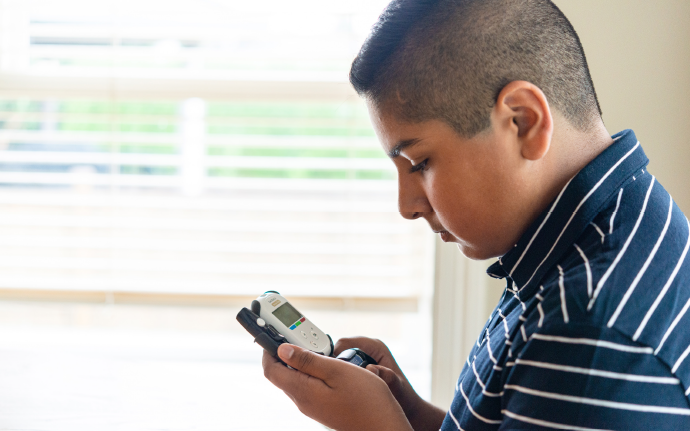For many kids with type 1 diabetes, their disease can feel like a life sentence
Nineteen thousand. That’s about how many needles 14-year-old Jayden Gill has had to use throughout his life to manage his type 1 diabetes. It means he’s had to prick his body five times a day—every day—since he was two and a half years old to check his blood sugar levels and receive insulin injections.

As a child, those needles were a normal part of Jayden’s life. Although a day never went by when he could avoid them, he took it all in stride.
That all changed when he reached adolescence and took on the responsibility of managing his condition himself.
And that’s when the feelings of frustration and exhaustion began to seep in. He noticed more and more how different his life was from those around him—and he started asking himself, “Why me?”
For many kids with type 1 diabetes, their disease can feel like a life sentence.
In the spring of 2018, when Jayden was 13, he quietly stopped his blood sugar monitoring and insulin injections. When his parents asked him if he was still taking the daily actions needed to care for himself, he said he was—but behind the scenes, he wanted to see if he could function normally without them.
Weeks passed, and Jayden became really sick. He would vomit for hours at a time, and complained of excruciating stomach pains.
Things got so bad that Jayden had to be rushed—twice—to BC Children’s for ketoacidosis, a life-threatening condition that could lead to a coma or even long-term brain damage if not caught in time.
That was a wake-up call for Jayden. For the first time in his life, he caught a glimpse of how grave things could become if he didn’t manage his disease carefully.
Jayden is one of 2,500 kids in British Columbia with diabetes. Ninety per cent have what he has: type 1, a serious, lifelong condition that currently can’t be prevented or cured and can lead to devastating consequences if it’s not managed closely.
Ketoacidosis, which Jayden experienced, is only one of the possible complications of the disease. Others could include heart or liver disease, amputations or even blindness.
This real possibility can put stress on families. Unlike type 2, which can be at least partially managed through lifestyle changes like diet and exercise, the only way to manage type 1 diabetes is to continuously maintain the right levels of insulin, an essential hormone to produce energy for the body.
It’s no wonder that for many kids with type 1 diabetes, their disease can feel like a life sentence.
Families affected by the condition require specialized care and support to ensure their kids stay healthy. Thankfully, today there are many advancements in technology and care that can ease the burdens of type 1 diabetes that weren’t around even just a decade ago.
These include devices like glucose monitoring sensors, which can monitor blood sugar levels without needles simply by waving a smartphone over it, and insulin pumps, which deliver insulin to the body without injections.
But a key part of treatment is understanding and getting specialized support for daily management of the disease. For families close to BC Children’s, this support is relatively easy to get.
But for families who live further away, it’s not so simple. Because of the burdens of cost, travel and time, they don’t always get the care they need when they need it.
This is troubling because research has shown that the further away a child with type 1 diabetes lives from expert care, the worse off they are. In a province that spans nearly one million square kilometres, this is a bleak picture. But it’s one that experts at BC Children’s are determined to change.
During Jayden’s second hospital visit for ketoacidosis, he met Dr. Shazhan Amed, head of the Division of Endocrinology at BC Children’s. This was a turning point for him.
“Jayden just gravitated towards [Dr. Amed] and they created a bond. She was very straight with him, but she was also very caring and gave him the exact encouragement and education he needed to manage his condition.”
— Kam, Jayden’s mother
Jayden is doing remarkably well now. His family credits Dr. Amed and the BC Children’s team for developing a sustainable plan to help Jayden and his family manage his condition—and for being a lifeline when they needed it most.
Dr. Amed and her team are driven to do more for all kids in BC.
As the diabetes team at BC Children’s tackles this gap, they are looking at ways to expand what they’re already doing—like partnering with health care teams in communities across BC—to ensure they have the education, tools and latest technologies they need to provide the same level of specialized care close to home.
But that’s not all. Experts here are looking at ways to expand use of technologies that are making virtual care possible for more patients, enabling them to stay in close contact with families without always needing face-to-face clinic visits.
They’re also working to improve access to the latest diabetes management technologies and training on how to use them. These resources will help reduce the daily burdens and stressors families face living with this complicated disease.
These are no small goals—but they’re ones that Dr. Amed and her team, with the help of donors, are making their mission.
Ultimately, they’re not only hoping to reduce complications and improve health outcomes for kids with type 1 diabetes, but to see them live the healthiest lives possible.
A Night to Transform Diabetes Care
Donors make transformative health care possible. This year, more than 440 guests at the 11th Annual A Night of Miracles, our South Asian gala, came together on November 2 to raise critical funds to help revolutionize type 1 diabetes care throughout the province.

